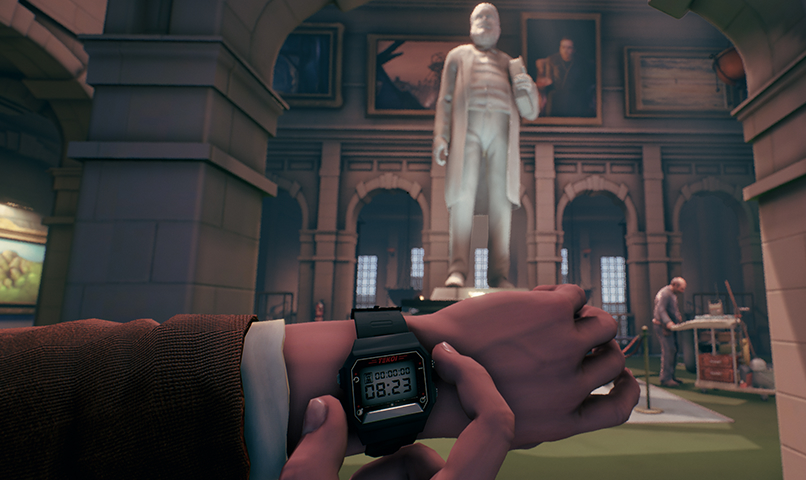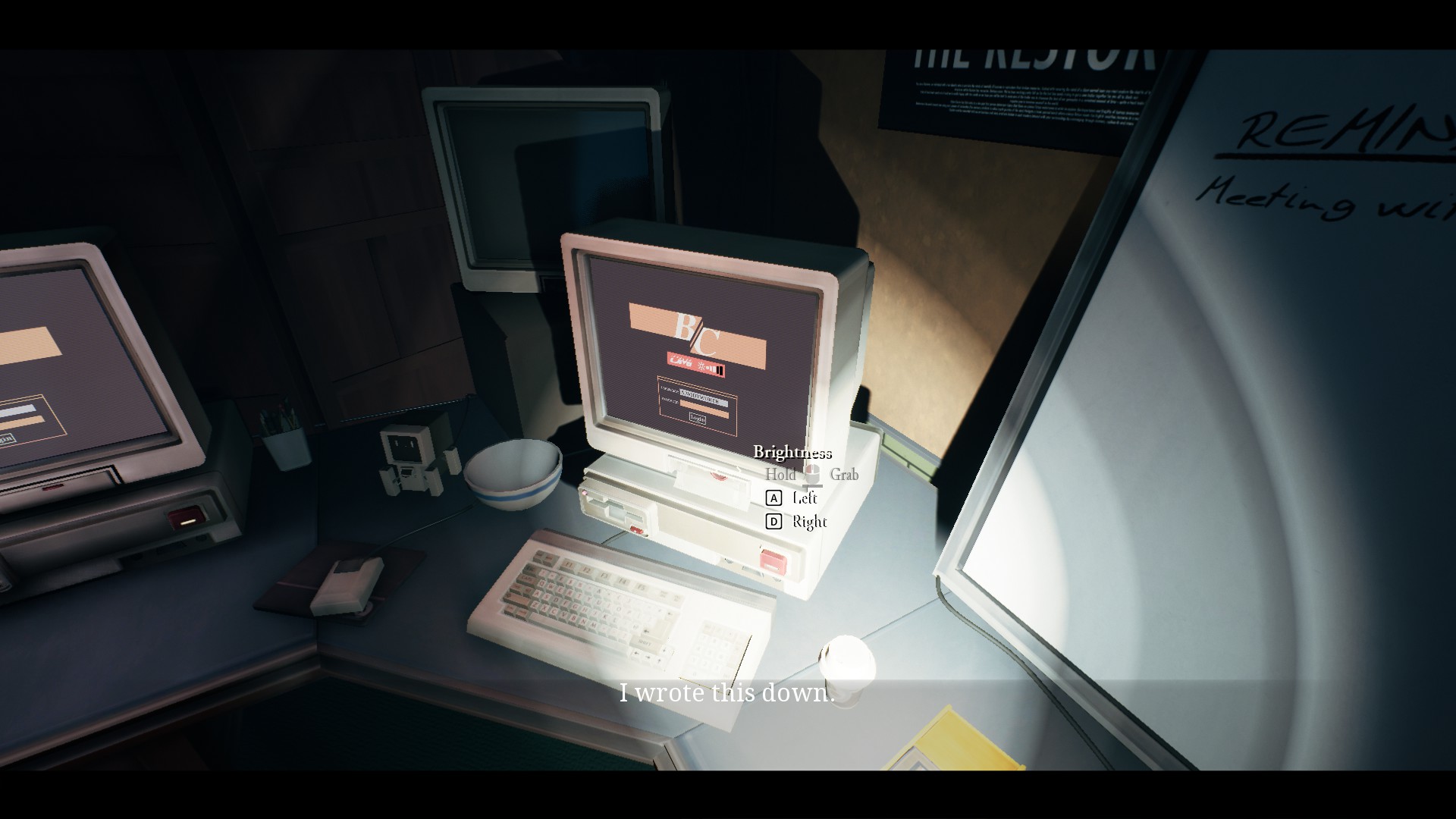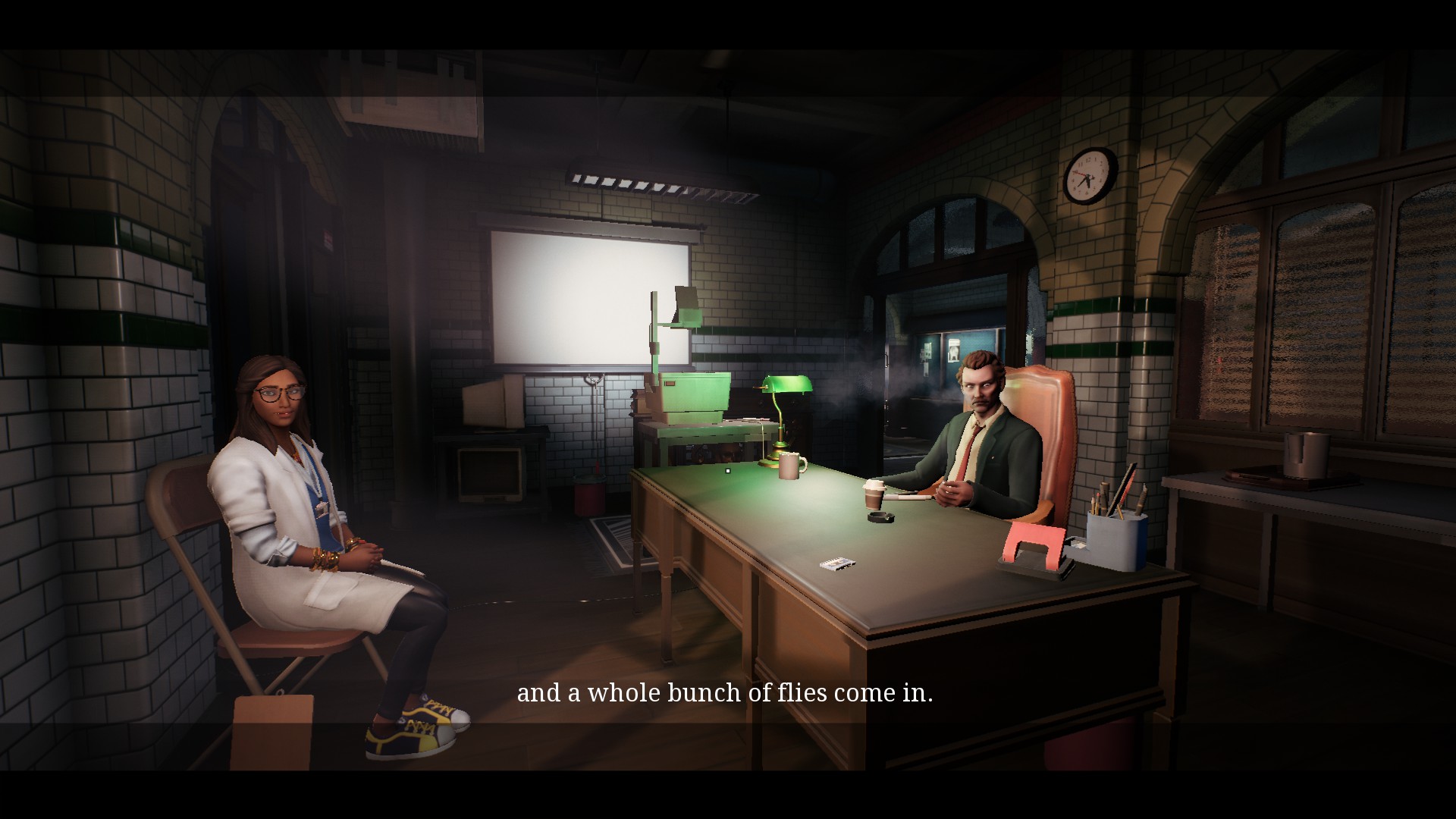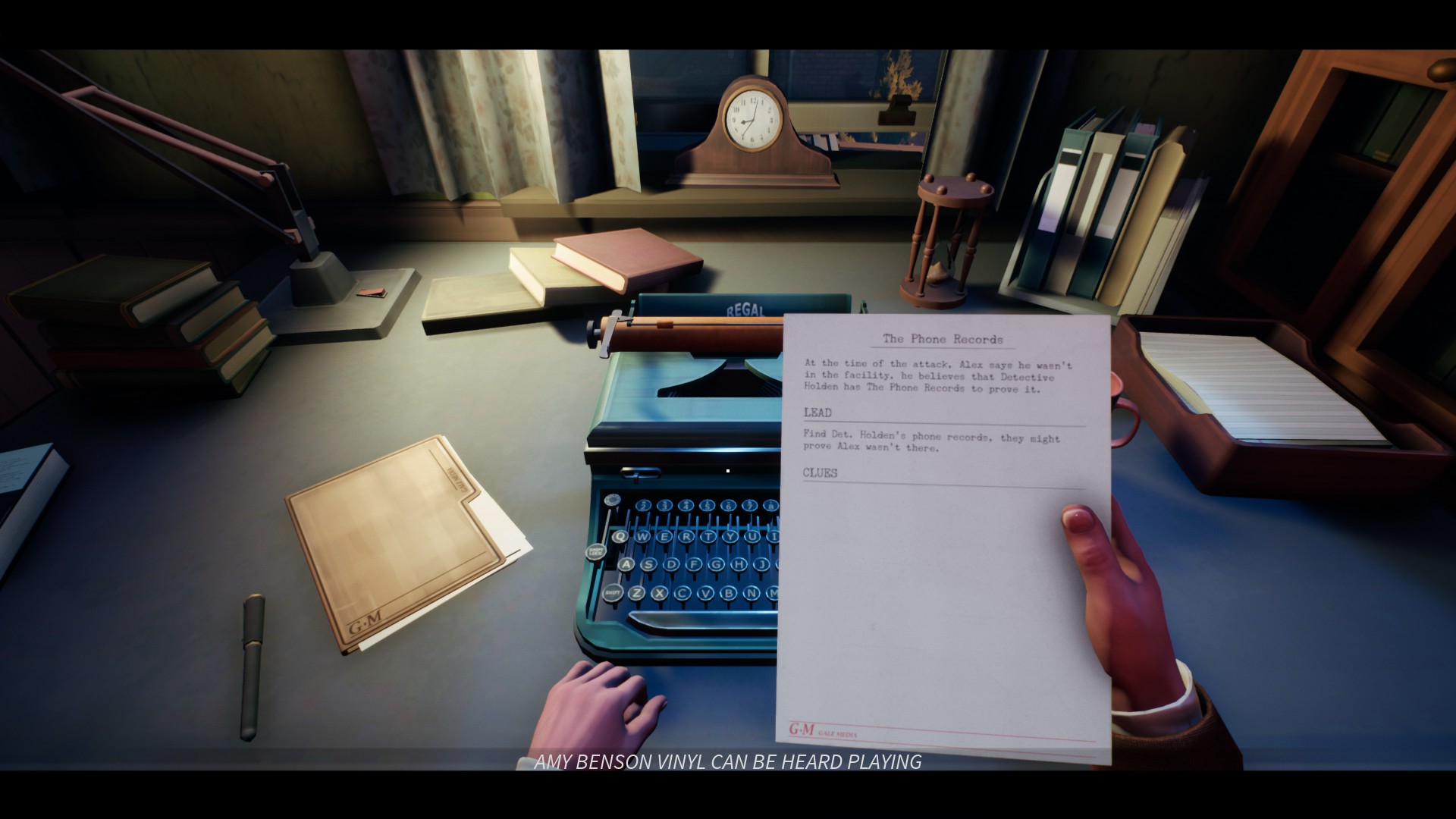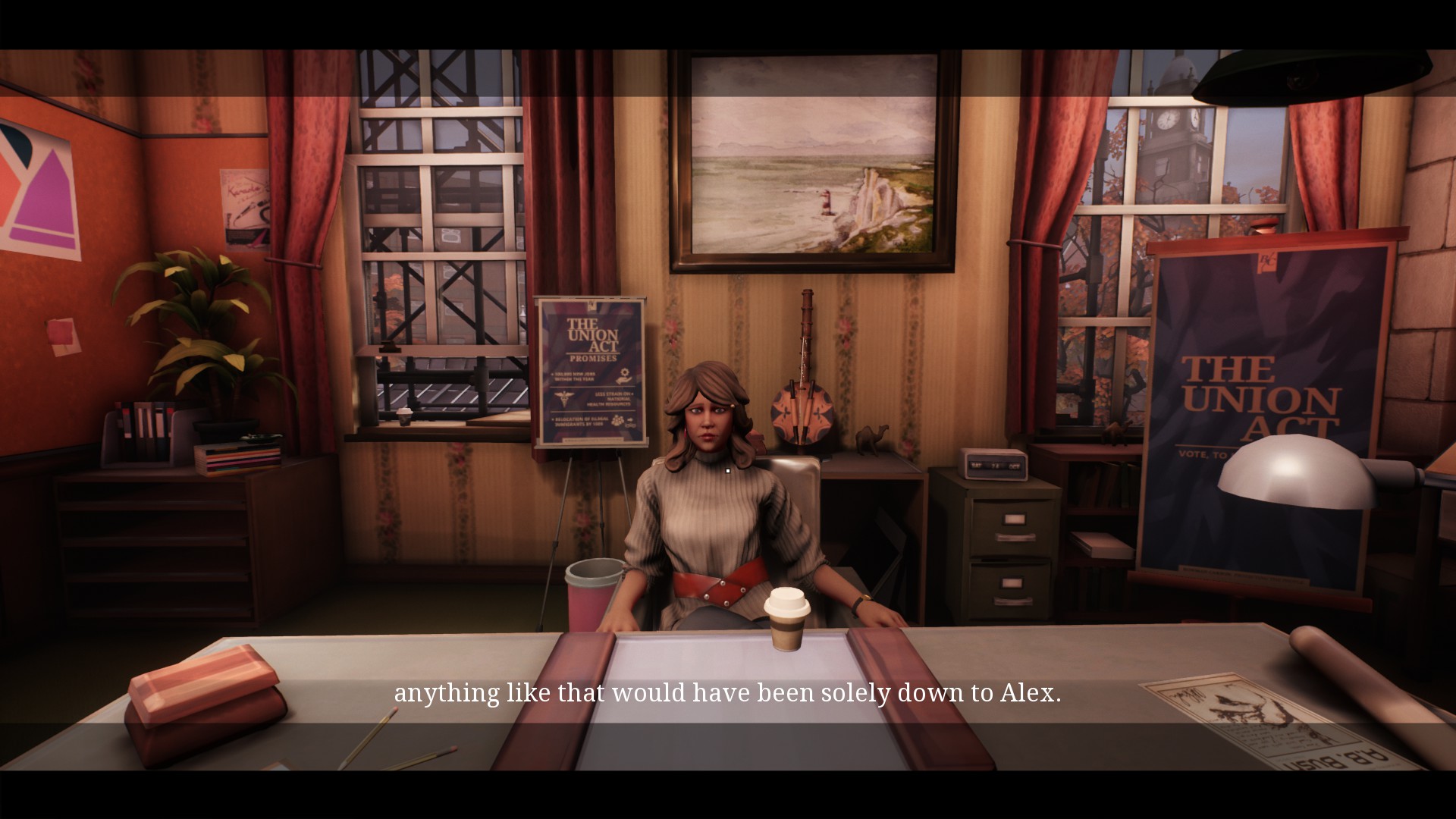Our Verdict
An occasionally brilliant immersive sim blighted by bugs and a restrictive save system.
PC Gamer's got your back
What is it? A politically-charged immersive sim about a journalist working against the clock.
Developer White Paper Games
Publisher Humble Bundle
Reviewed on GeForce GTX 1070, Core-i7 8750H, 16GB RAM
Multiplayer No
Link Official site
Buy it Steam, Humble Store
The Occupation, a game about investigative journalism, feels like a rough first draft of something spectacular.
When it works like it’s supposed to, it's the best immersive sim since 2017’s Prey: you solve inventive, multi-stage puzzles in labyrinthine offices by swiping key cards, cracking safes, pulling crumpled memos from bins, and printing incriminating documents from whirring computers.
The bulk of the game plays out over four real-time hours, and three sections have a time limit. It creates a tension I haven’t seen in the genre before, and makes every second—every agonising moment spent waiting for an incoming fax to screech into an out-of-bounds office—feel vital.
Unfortunately, it’s simply not ready for release. For every clever clue, I encountered a frustrating bug, one of which cost me a full hour of progress. The restrictive save system means you can’t reload when the game inevitably breaks, and it also stops you from exploring these intricately-designed spaces over and over, which feels like a massive missed opportunity.
You play as journalist Harvey Miller, who’s writing a report on an explosion at the Bowman Carson Group’s headquarters in north-west England. The group is helping the government co-ordinate The Union Act 1987, a controversial bill designed to restrict civil liberties and crack down on immigration, all in the name of national security. The blast has been pinned on Alex Dubois, an employee whose family face deportation because of the Act. It’s your job to find out what really happened.
It’s centered on those three timed sections, set in their own self-contained, sprawling spaces. In the first two, you have exactly an hour to gather clues before you interview a Bowman Carson employee—for the third, you only have half an hour, but your goal is more focused.
In each, you follow several leads that resolve in clever ways. For one, I uncovered the password to an employee’s computer, saved one of her emails onto a floppy disk, and took it to a printer hidden in a restricted area, ready to brandish at the interview later. For another, I followed a trail of love letters containing cryptic clues about where the next one was placed, eventually leading me to a tape recording hidden in a wall flap.
Keep up to date with the most important stories and the best deals, as picked by the PC Gamer team.
You can approach every lead from multiple angles. To break into the head of PR’s office, for example, I had four options. I could crawl through the vents, slip in through the window from some scaffolding, cut the fuse box to the keypad at the door, or swipe her card and punch in the code myself. I could find the code in an email on a PC one floor below—or, I could just peer over her shoulder as she tapped away.
I enjoyed that freedom, and I love how the leads overlap. While searching a detective’s office for phone records I came across a vent system leading to a part of the map I didn’t know existed. The levels are so densely packed with potential clues—notes pinned to monitors, locked doors requiring coloured access cards, desk draws begging to be pulled open—that it’s almost impossible to feel stuck.
The ticking clock, combined with security guards wandering the corridors, ensures you keep moving forward. The final five minutes of each level were a proper panic, as I scrabbled to get leads ticked off, and The Occupation ramps up the tension by simulating clunky, physical interactions. To print a document you must hit the computer’s power button, wait for it to boot up, insert a floppy disk, pick a file to print, pick a printer and then wait again while the paper chugs out. It feels wonderfully tactile—until you glance and your watch and realise you’ve only got two minutes left.
I like that the time limit forces you to choose which leads to follow, and that it’s virtually impossible to complete all of them on your first playthrough. I wish, however, that it let me revisit those levels after I’d finished them. My very first run at a timed section felt a bit like a scouting exercise, and I was only able to complete one lead. I wanted to go straight back and see more—but once I’d finished my interview, I couldn’t reload it. I had to live with my failure for the rest of the story, which reacts to your performance.
The developers tell me they’re keen to add a ‘replay chapter’ feature, but it was “thought of too late in development” to work in before release. You could simply quit just before the end of your hour and try again, which I did during my second playthrough of The Occupation. But it’s not ideal, because you might want to see how the story plays out before reloading.
A proper save system would also provide a way around it. Currently, the game only saves at the end of each chapter, so you can’t save and reload if you muck up. I’m all for any system that makes you react to your mistakes, and it helps that the game is forgiving. When a guard catches you in a staff-only area, they’ll first tell you to leave, and only after multiple requests will they take you to a security office for a slap on the wrist.
The big problem is that The Occupation is a buggy mess, and some of those bugs can break your game. The worst instance I encountered was when one of my interviews failed to trigger. I arrived bang on time at the right office and the name of my two interviewees flashed on screen as I took my seat. But neither of them entered the room. I was locked in place, unable to progress, and I watched fifteen minutes tick by before giving up and restarting the chapter, which cost me a full hour of progress.
In another section, the two security guards both lodged themselves inside the same wall, and all I could see were their noses and eyes poking out. It was comical, as if the bricks were wearing those Groucho glasses disguises, but it completely ruined the pacing of the level. I could stroll around the restricted areas without any danger of getting caught.
More minor, but equally annoying bugs included the game telling me the wrong pass code for a safe which housed a key lead, letters vanishing from my inventory, my character floating in mid-air and only coming down after I wrestled with the controls for ten minutes, and keyboard prompts displaying the wrong key to press.
On four occasions, I got stuck between a security guard and a wall, unable to move. The guard kept demanding I leave the area, and when I didn’t—because I couldn’t—he lost his cool and confiscated my briefcase, with all my notes stashed inside.
White Paper Games says a day one patch will fix "minor bugs", but the variety of the issues I encountered suggest it’ll be a while before The Occupation is totally fixed.
In isolation, the bugs would be frustrating, but because they exist alongside the restrictive save system, you’re in constant danger of losing your progress. If you come across a bug that ruins a chapter, your only choices are to battle through or restart the whole section again.
I’ve learned to live with them for now, and I’m already well into my second playthrough. It’s not just the puzzles that have pulled me back—I wanted to find out more about the characters and the world around them. The plot is a little confusing because it sets up a mystery to be solved (what caused the explosion?) and then later veers into something entirely different, throwing lots of information at you at once. I’d rather have just unravelled the initial question, which feels like it’s tossed aside too hastily.
But The Occupation’s surprisingly nuanced take on certain aspects of UK politics has drawn me back in, and the characters echo real-life politicians. They’re conflicted and confused in believable ways, and the voice acting is utterly fantastic, each line delivered with conviction. These NPCs can be charming, too: Marlon, the office cleaner, is my favourite. He’s from a northern mining town, and will tell anyone that will listen about the “hypocrites” who want to cut immigration. “If you don’t want the French ‘ere, then put down your bloody baguettes”, he says. “Quiche, that’s another one, and all them nice cheeses”.
On my second playthrough, I understood the story better, but I still haven’t fully grasped it, and I plan to jump in a third time so I can 100% all the levels. Usually, I’d heartily recommend any game I like enough to replay, but The Occupation is basically broken in its current form. Despite its brilliant levels, you shouldn’t consider buying it unless you can put up with losing an hour of progress without warning.
Perhaps it’s best to wait for the second draft.
An occasionally brilliant immersive sim blighted by bugs and a restrictive save system.
Samuel is a freelance journalist and editor who first wrote for PC Gamer nearly a decade ago. Since then he's had stints as a VR specialist, mouse reviewer, and previewer of promising indie games, and is now regularly writing about Fortnite. What he loves most is longer form, interview-led reporting, whether that's Ken Levine on the one phone call that saved his studio, Tim Schafer on a milkman joke that inspired Psychonauts' best level, or historians on what Anno 1800 gets wrong about colonialism. He's based in London.
